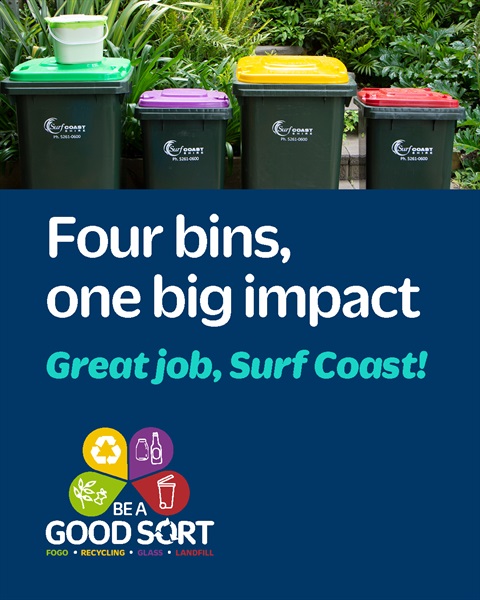
Surf Coast Shire Council has released a waste report card showing how the four-bin system has changed the way residents manage their waste - and the difference it is making to the environment.
More than 70 per cent of all residential waste is being diverted from landfill thanks to the four-bin system.
The report, which compiles data from the last 12 years, tracks the tonnes collected from each bin type.
It shows key milestones in the journey toward a more sustainable waste system:
- July 2019 - the financial collapse of Council's recycling contractor saw an increase in landfill tonnage.
- December 2019 - the Anglesea FOGO (Food Organics and Graden Organics) trial began, allowing residents to place all food and green waste in the green lid bin, leading to a reduction in landfill waste.
- January 2020 - a new recycling contractor was appointed, with landfill tonnages falling and recycling increasing.
- February 2021 - the purple lidded glass bin was introduced, improving recycling quality by diverting glass from the recycling bin. All households could put food waste in their FOGO bins. As FOGO tonnages increased, landfill tonnages fell.
Cr Adrian Schonfelder said the data paints a clear picture of how residents' efforts are paying off, but also where improvement is needed.
"Or community has made great progress in sorting their household rubbish and recycling to reduce the amount we sending to landfill," said Cr Schonfelder.
"We have some of the lowest contamination rates in the region with one per cent contamination in our FOGO and glass-only bins. This means almost everyone is putting the correct items in these bins."
"However, regular audits show that more than half of what's going into red bins could actually be recycled or composted."
Audits reveal that 52 per cent of material in landfill bins should have gone into FOGO, glass or recycling bins. One concerning trend is a decline in food waste in FOGO bins, not because there is less waste, but because food scraps aren't making it to the right bin.
"All food belongs in the FOGO bin and every peel, crumb and core counts," said Adrian.
"When food and green waste goes to landfill, it takes up valuable space in the Anglesea landfill, which is nearing capacity. Once it's full, our waste will need to be transported further, increasing costs for everyone."
"Food and garden waste placed in the FOGO bin is turned into nutrient rich compost, helping to grow more food and close the loop on waste," he said.
Read the waste report card at surfcoast.vic.gov.au/WasteReportCard






